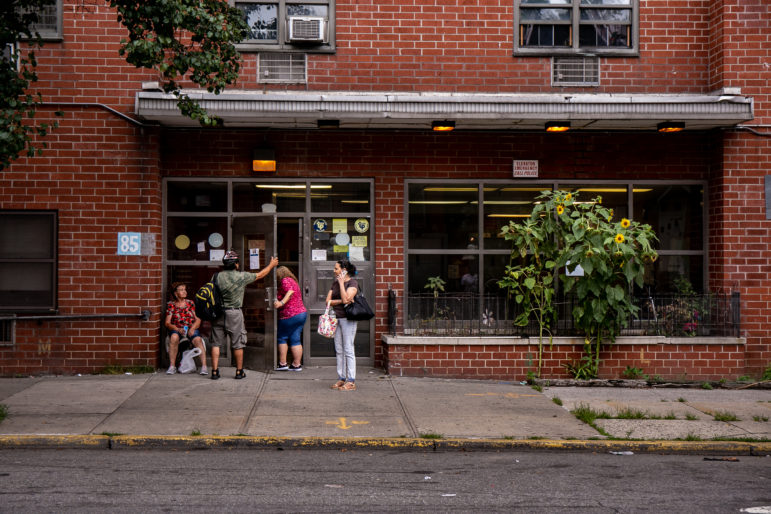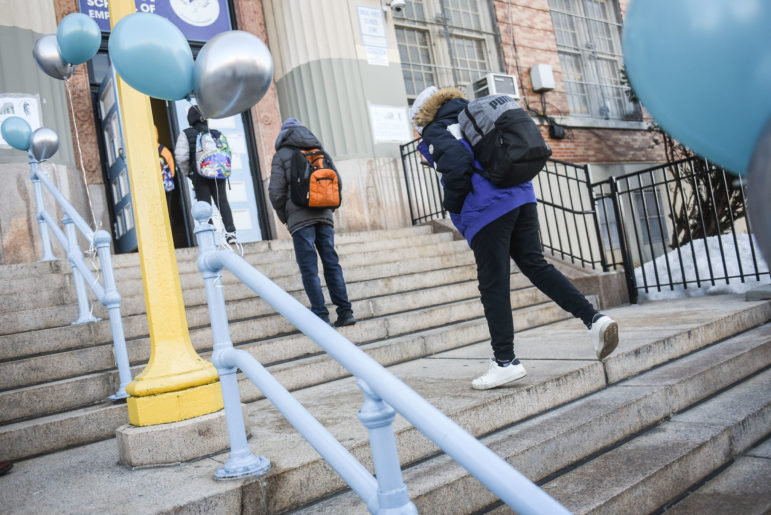“If NYCHA is so dependent upon federal funding, doesn’t the federal government have, not just a moral, but a legal obligation to adequately fund federal housing?”

Adi Talwar
The Hope Gardens NYCHA development in Bushwick.Public housing in New York City is a critical lifeline to many low- and moderate-income New Yorkers. There are certain facts about NYCHA that are, indeed, astonishing. For example, NYCHA developments house at least 339,900 people, which amounts to 3.9 percent of New York City’s entire population. Rents are adjusted with income, which means that even when residents face economic hardship—for example, due to illness or loss of a job—they have the ability to keep their rent affordable and avoid housing instability or eviction. NYCHA has also been a leader and model of innovation in various fields, including energy efficiency, climate resiliency, and waste management.
But there is no denying that NYCHA has been plagued with problems of immense proportion. Things became so dire that, in 2019, NYCHA entered into a settlement agreement with the U.S. Department of Housing and Urban Development (HUD) after federal prosecutors alleged that NYCHA was systematically failing to maintain its properties in a safe and sanitary manner. They also alleged that NYCHA had engaged in deceptive practices regarding the existence of lead-based paint in its apartments with children living in them. Since then, while NYCHA has made incredible efforts and steady progress, grave and systemic problems remain.
I briefly worked at NYCHA as special counsel in the Office of Strategy & Innovation, a small unit whose mission is to develop and implement the transformative changes required by the HUD agreement. This position allowed me to see first-hand how a significant portion of NYCHA’s ongoing problems stem from two things: first, NYCHA’s portfolio comprises aging and deteriorating housing stock, and second, NYCHA lacks the funding to undertake wholesale modernization efforts across its portfolio. In fact, in 2017, NYCHA determined that it would need $45.2 billion to adequately meet its capital needs over the next 20 years. That is money that it simply does not have.
NYCHA receives funding from various sources. A central component, however, comes from the federal government. Specifically, NYCHA receives about 60 percent of its operating budget and 50 percent of its capital budget from federal funding. Yet federal investment in public housing has steeply declined since the 1970s, as there was a political push away from public housing and toward privatization. Since 2000 alone, there has been a 17 percent decline in public housing funding from the federal government. The decline has forced NYCHA to think of creative methods to close the funding gap by converting developments from public housing to a form of Section 8, whether through the RAD/PACT program or the New York City Public Housing Preservation Trust. Those options, however, are complex and have engendered some controversy.
My time at NYCHA and background as a litigator led me to question: If NYCHA is so dependent upon federal funding, doesn’t the federal government have, not just a moral, but a legal obligation to adequately fund federal housing?
The answer to that question, in my opinion, is yes. The federal Fair Housing Act requires HUD and other executive agencies to take action to affirmatively further fair housing. HUD’s obligation has traditionally been understood to require it to take actions that will end segregation and housing discrimination. HUD’s own interpretation of the law also demonstrates that the AFFH mandate requires it to “[t]ransform racially or ethnically concentrated areas of poverty into areas of opportunity.”
NYCHA developments fit this description. According to data current through March 2022, 43 percent of NYCHA’s families identify as Black, and 45 percent identify as Hispanic; 42 percent of public housing families survive on a fixed income, and over 12 percent receive public assistance. Moreover, many NYCHA developments are located in areas that could be considered lower-opportunity, meaning that they are far from cultural and commercial hubs and are located in areas with relatively high crime and poverty rates.
And while HUD is not intentionally discriminating against NYCHA residents (and, in fact, has many smart, dedicated, and hardworking public servants who fight daily to improve life for NYCHA residents), its inability to adequately fund public housing is nevertheless disproportionately impacting Black and Latinx New Yorkers. The failure to adequately fund public housing is, therefore, arguably, the failure to take meaningful action to affirmatively further fair housing.
Of course, HUD does not allocate its own funding, so while it may be responsible on paper, it is not necessarily to blame. Funding is Congress’s responsibility. Yet when it comes to obligations mandated by federal law, strained resources may not be a defense. Recently, Chief Justice John Roberts noted in an argument regarding federal immigration enforcement that it’s the Judicial Branch’s “job to say what the law is, not whether or not it can be possibly implemented or whether there are difficulties. . . I don’t think we should let [the Executive Branch] off the hook.”
The courts, thus, have a role to play in the fight for fair housing. Specifically, they have the ability to declare that the failure to provide sufficient funding to NYCHA to allow it to meet its operating and capital needs is inconsistent with the obligations imposed by the Fair Housing Act. If Congress won’t voluntarily fund public housing, there may be an opportunity for courts to “say what the law” is to help ensure that NYCHA residents have safe and habitable homes.
Andrew Darcy is a supervising attorney in the Housing Project at Mobilization for Justice, Inc., where he represents tenants in eviction proceedings and in matters relating to the Fair Housing Act.









2 thoughts on “Opinion: Feds Can Further ‘Fair Housing’ Goals by Adequately Funding NYCHA”
Money is allocated annually to nycha for be repairing developments, you by may not be able to address all the issues at that time, but start be with some of them. Then over the years as the budget increases you. Can do more. Instead of waiting until it becomes a total disaster. Thank you
NYCHA is a endless bottomless money pit and a drain on NYC taxpayers.